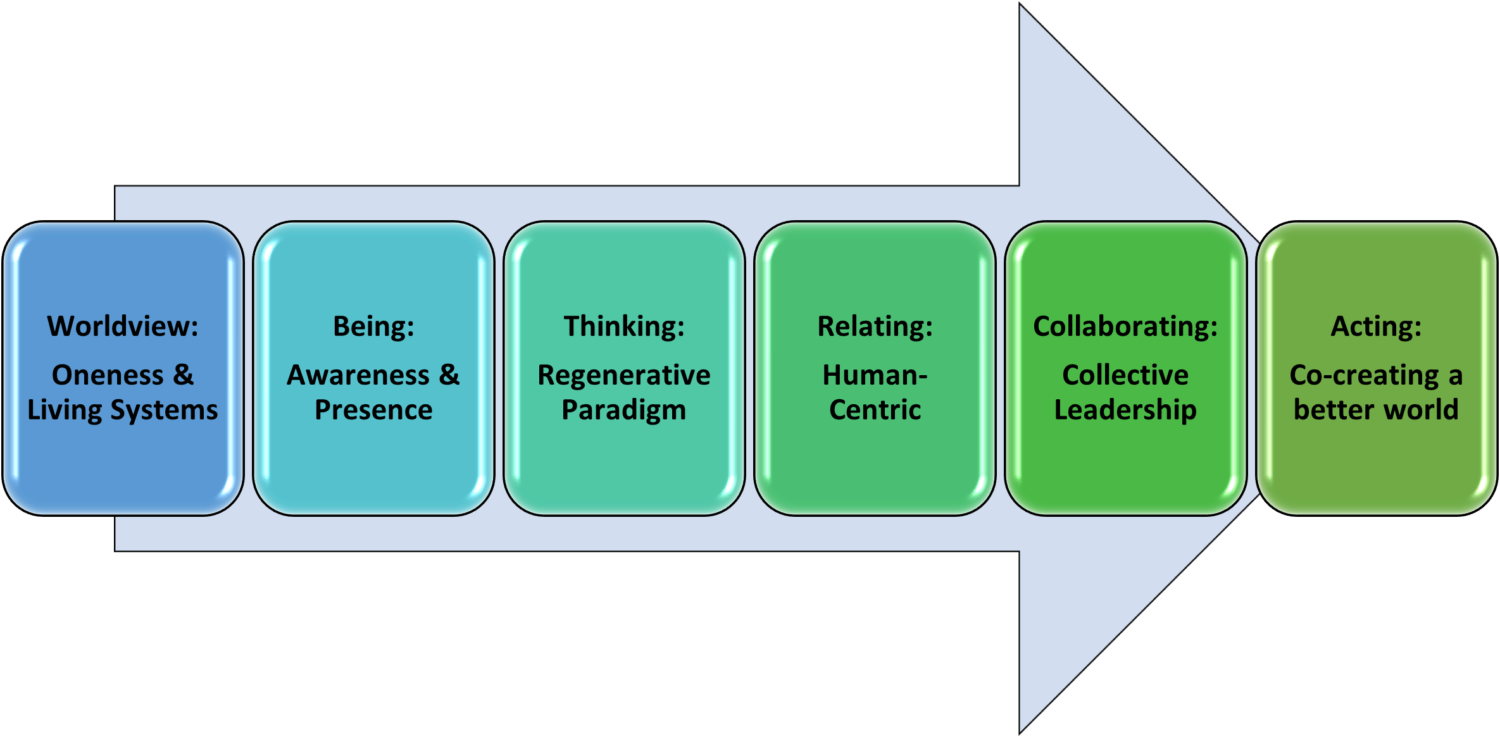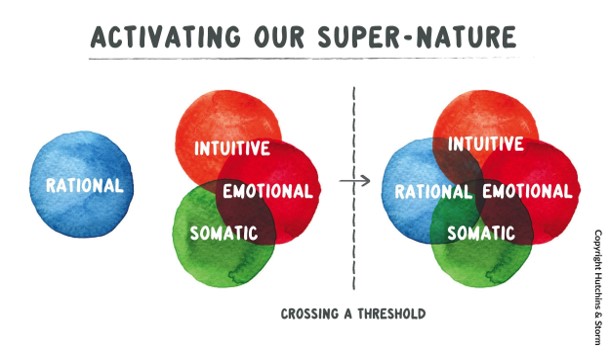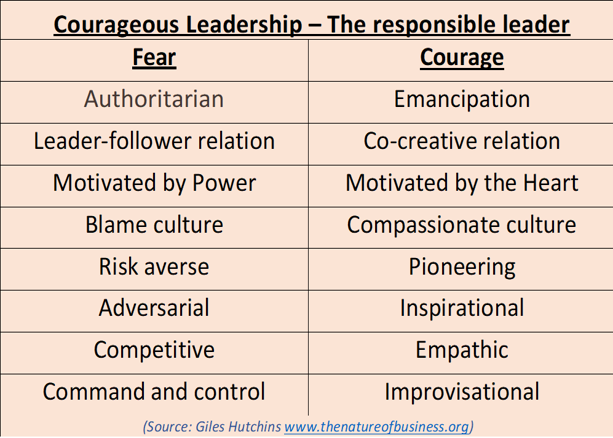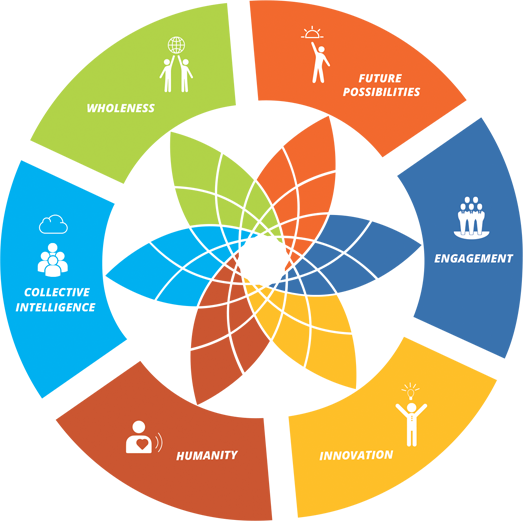Mavericks for Active Hope: Creating Greater Impact.

I was on a Zoom call recently with a title of “Mutineers: Pioneering Regeneration” on how leaders can step outside of today’s systems and catalyse change. What a wonderful title and conversation thanks to Third Horizon. I prefer, though, to be considered a Maverick for Active Hope, and have been reflecting on this for a fair while…..
Capitalism and neoliberalism have had significant benefits and taken many people out of poverty, but have hit a wall of ecological degradation, deepening inequality, disengagement at work, and significant mental health issues that have led many people to consider that there must be a better way to run our world.
Dreaming and acting for a new future is not to tweak the old but to put it aside and find a new way to create a peaceful, compassionate, selfless, thriving society for future generations, the environment and each other.
The following is an outline of how we may catalyse this thriving society that I have gleaned from 40+ years as a UK Chartered Accountant in for profit and not for profit organisations and many influential courses. I have envisioned this future through the lens of worldview, being, thinking, relating, collaborating and acting, as in the diagram above. The last five of these pilers are actually the Inner Development Goals[i] (IDG’s) for which I am the coordinator of the IDG Lemanic Network. The Inner Development Goals are an accelerator towards achieving the United Nations Sustainable Development Goals[ii] (UNSDG’s). The views I express here are my own and should not be thought as those of the Inner Development Goals organisation or the Lemanic Network.
There is an enormous amount of research and knowledge about the problems we face and ideas for creating a better world. I wish to encourage your curiosity to reflect on your worldview, being, thinking, relating, collaborating, and acting and therefore, how you can use these to contribute to a better world.
Worldview: Oneness & Living Systems
Science, spirituality, ancient and indigenous wisdom are coming together to explain that we are not separate from and are in fact one with nature and interconnected with each other. Terms such as oneness, universal mind, and living systems field, are also used to point to a natural intelligence, a pervasive field that informs us and the world around us.
This worldview encourages us to respect and look after nature and each other.
Being: Awareness & Presence
Quality physical exercise, nutrition, rest & renewal, and biomechanics provide a strong foundation to understanding who we are at our core and our sense of awareness and presence. Our core being is shaped by our values, purpose, passion, awareness & presence, emotional/mental/and spiritual energy and contribute to a greater sense of flow and aliveness.
Creating this alignment or coherence with our presence and awareness is to prioritise “being” over “doing”. We can help this happen by developing our self-awareness, connecting with our inner compass, relating deeply with nature, settling our mind, and reconnecting our rational intelligence with our emotional, intuitive, and somatic intelligence.

I believe that the quality of our inner being, drives our outer doing. This is the inside-out understanding or “quality of mind”. When we more fully appreciate how the mind works from the inside-out, we align more fully with our true selves. It’s nice, it’s peaceful. What can be better than getting to really know ourselves.
This may sound like a huge effort but is simpler and quicker than you may think. An insight can happen in the blink of an eye and lead to a life enhancing journey of personal understanding and aliveness.
Thinking: Regenerative Paradigm
This whole article is about a shift to a Regenerative Paradigm. I’m highlighting this under “thinking” as Living Systems thinking is the basis of it.
A Regenerative Paradigm is for a world where purpose, people, planet and profit can thrive collectively by tapping into the wisdom of nature.
Giles Hutchins[iii] & Laura Storm[iv] co-wrote the remarkable book entitled “Regenerative Leadership” and are at the forefront of promoting nature as our guide. From Laura’s www.regenerators.co website:
Nature has immense wisdom for leaders able to tap-in and truly connect. Nature is emergent, adaptive, resilient, co-creative, receptive and responsive, the very qualities we need to succeed in the future.
The new paradigm calls for a new approach to how we prioritize the well-being and inner resilience of leaders and employees to ensure thriving, vibrant, innovative and creative organizations that are able to deliver in an ever more complex world.
Part of the Regenerative Paradigm for organisations is its ‘inner-nature’, its culture and the day-to-day ways in which people show up, share, exchange tacit knowledge, gossip on social media, co-create and connect in and out of the office. The ‘outer-nature’ is its brand, external communications, PR, stakeholder relationships, and impact on various groups outside the business. Successful organisations will be those that integrate the inner and outer aspects so that they feel deeply connected.
Relating: Human-Centric
An effective inner culture of an organisation and the outer connection with the ecosystem of stakeholders is all about building deep relationships.

Organisations predominantly have a mechanistic hierarchical way of working which has characteristics such as leader-follower relationships, centralised decision-making, silo working, micro-management, and overly bureaucratic and controlling cultures. This has contributed enormously to the crises we face.
The operating system of the organisations needs to become more human-centric via self-organised teams, decentralised decision making, more diversity and inclusion, appreciative inquiry, creative meetings, and care for each other.
A movement from “I” to “WE” is at the heart of this change towards appreciation, connectedness, and empathy towards others – from “what is in it for me?” to contributing to thriving employees, communities, and service to society and the planet. This means that the quality of relationship building with all of their stakeholders is paramount to the success and impact of any sustainable development project or organisation.
Again, this may seem like a mountain to climb, but is just a change in mindset and a higher quality of collaboration and action follows.
Collaborating: Collective Leadership
Creating greater project and organisational impact requires engaging stakeholder collaborations.

I am a Collective Leadership Specialist of the Collective Leadership Institute[v]. The Institute builds competence for sustainability projects through project management and training. Their website states:
To create a sustainable world, we need to recognize and use our interconnection and interdependence for the common good. The Collective Leadership Compass helps to make that happen. It is a methodology that helps individuals, teams, and stakeholder systems shift their focus from an individualistic to an inclusive and co-creative way of working as a group of collective leaders – achieving a sustainable impact.
The Compass consists of six dimensions, each representing a core aliveness principle. Attention to these dimensions increases the capability of all team members and involved stakeholders in a change initiative to connect and collaborate with each other. This leads to more aliveness or vitality in a change initiative’s collaboration system as quality dialogue, shared vision, ownership, and commitment are increased, leading to effective collaboration and better results.
Self-awareness and system-awareness are essential, whilst quality processes are the glue to keep the stakeholders wanting to remain and champion their projects.

My work in a Geneva based NGO helped me learn that a deeper understanding of what constitutes quality collaboration is required for stewarding transformative change.
Acting: Co-Creating a Better World
What is the future you want to help create for you, your family, community, team, organisation, society and the planet?
The United Nations Sustainable Development Goals are comprehensive but, for me, do not clearly provide a vision of the future.
I would like to help co- create a peaceful, compassionate, selfless, thriving society for future generations, the environment and each other.
The global issues we are facing are so overwhelming that this needs a fundamental shift to a Regenerative Paradigm, which I have outlined through the lens of worldview, being, thinking, relating, collaborating, and acting.
My contribution to co-creating a better world is partnering with like-minded individuals and organisations to encourage a shift to a Regenerative Paradigm to co-create a better world.
I believe that we can all be Mavericks for Active Hope.
Curious and wish to discuss more?
Chris Burton is a UK Chartered Accountant, Collective Leadership Specialist, Inner Development Goals coordinator, and was part of the 2022 Regenerators Academy programme. I have many partnering consultants and coaches.
[i] www.innerdevelopmentgoals.org
[ii] THE 17 GOALS | Sustainable Development (un.org)
